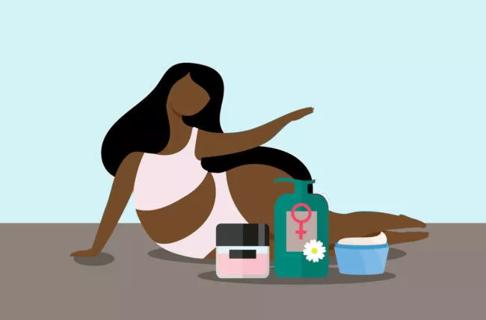Yes, it could be a yeast infection, but there are also several other causes for an itch down there

The symptoms of vaginal itching are familiar to many women: Itching and irritation, sometimes paired with a thick white discharge.
Advertisement
Cleveland Clinic is a non-profit academic medical center. Advertising on our site helps support our mission. We do not endorse non-Cleveland Clinic products or services. Policy
Noticing these symptoms, you may automatically assume it’s a yeast infection and reach for antifungal treatments. Or maybe you’re wondering if a new brand of underwear or detergent is to blame.
But vaginal itching can be due to several different causes — and each one needs to be treated differently. For example, trying to treat a non-yeast-related condition with antifungals will not only be ineffective, it may give you the illusion that you’re treating the issue while the actual problem continues to develop.
Ob/Gyn Salena Zanotti, MD, explains some conditions that can cause vaginal itching — and how some of them can mask themselves to seem like yeast infections. Let’s uncover how to tell the difference.
Here are eight possible causes of vaginal itching:
First up — let’s go over the common culprit: A vaginal yeast infection. It’s caused by a fungal overgrowth of yeast and there are some key signs that will point to it. For one, you may notice a burning or itching sensation and you’ll feel it in and around your vagina. You also may notice a change in your vaginal discharge — if you’re noticing that it’s become very thick in consistency, that’s a key sign.
But if these symptoms come back often (or don’t respond to the usual treatments), it’s time to visit a doctor for a firm confirmation on whether you have a yeast infection or not. The main way you treat a yeast infection is by getting an antifungal treatment — and usually, this does do the trick.
Advertisement
Some sexually transmitted infections, or STIs (also known as sexually transmitted diseases), can cause irritation and present with an itchy discharge and a slight odor.
Some STIs that have vulvovaginal (relating to the vagina and vulva) itchiness as a symptom include:
If you’re wondering if your itching may be coming from an STI, be sure to see a doctor so you can get a proper test.
Just like certain irritants can trigger your nasal allergies, the same can happen to your vagina. Sometimes, certain fabrics or fragrances just don’t agree with that part of your body.
Switching to hygiene products like scented tampons and pads — which are all-around not a good idea, by the way — can lead to an itchy, irritated sensation in or around the vaginal area.
And bath soap or even a change in laundry soap can cause a reaction in your vagina. That’s partially why it’s recommended to avoid douching, or “over-cleaning” your vagina — to avoid any added irritants.
If you notice that switching to certain menstrual or hygiene products with added fragrances causes your vagina to itch or even burn, stop using them right away and see a doctor if the symptoms still persist.
It’s not the most cutesy name, but jock itch — also known as tinea cruris — can sometimes be a culprit behind itching around your vagina. It’s similar to an athlete’s foot, which often happens due to sharing towels or undergarments, but in this case, it’s focused on the groin area.
This itching is generally around the thighs and crotch, so if your irritation is more localized to the inside of your vagina, it’s probably not this.
But if you’re noticing any redness or irritation around these areas that aren’t going away, it’s a good idea to see a doctor so it can be evaluated.
As we get older, different parts of our body start to go through changes. For women, a lack of estrogen can cause the skin to thin, sometimes leading to discomfort, itching or discharge.
This can happen to women as they go through menopause and to some women who are breastfeeding. Vaginal lubricants or a small dose of estrogen can help in this case.
While hemorrhoids occur due to swollen veins in your rectum, the itching and irritations associated with this condition can also spread to your vaginal area. If the itchiness you’re feeling isn’t just happening in or around your vagina but also near your anus, this could be a sign of hemorrhoids.
Advertisement
For hemorrhoids, you can find some relief by using home remedies like aloe vera, having good hygiene or using over-the-counter-ointments. But if you’re experiencing persistent itching and rectal bleeding, see a healthcare provider.
Your vagina isn’t immune to skin conditions either. Some skin conditions can cause skin changes, such as whitening and itching. Things like contact dermatitis or folliculitis (inflammation of a hair follicle) can both happen around your vagina.
If you’re noticing a red, itchy and even painful skin rash, it could be a sign of a skin condition. According to Dr. Zanotti, these may require a steroid ointment such as hydrocortisone for treatment.
Bacterial vaginosis rears its head when the “good” bacteria and “bad” bacteria in your vagina are at odds with each other. Your vagina is a delicate ecosystem that needs balance, so if the bacteria sway too much to one side, it could lead to an infection.
There is a distinct odor that accompanies bacterial vaginosis, so if you’re noticing a strong “fishy” smell coming from your vagina paired with itching and irritation, this could be a tell-tale sign. You may also notice a discharge that’s a pale gray or white.
Advertisement
While for some women this goes away on its own, in some cases your doctor may recommend some antibiotics to really send it packing.
An occasional vaginal itch here and there is normal. But if it’s consistent or gets worse, it can be a sign of something more serious. That’s why it’s important to take note if your vaginal itching is starting after a change in routine — like using certain menstrual products — or if it came out of the blue.
Be sure to see a doctor if:
Depending on the reason behind your itching, there isn’t always a one-size-fits-all remedy. Be sure to talk to your healthcare provider to see what treatment is best for you.
“If you aren’t getting relief from the usual measures, or you aren’t quite sure of the diagnosis, it’s worth a trip to the office to get checked out,” advises Dr. Zanotti.
To help keep any itchiness and irritations to a minimum, here are some do’s and don’ts when it comes to vaginal care:
Advertisement
If you’re feeling vaginal itchiness, it’s nothing to panic or be embarrassed about. Make sure to listen to your body’s warning signs to help figure out what could be causing the itching — especially if the symptoms are becoming persistent and interfering with everyday life.
And please don’t put off seeing a healthcare provider, as they may have a quick solution for you.
Learn more about our editorial process.
Advertisement

Strong vaginal and groin odor is normal for many people — it can be the result of sweat, urine, infections and more

Infections, cysts and conditions like endometriosis can result in a host of symptoms like burning and itching

Moisturizers, lubes and prescriptions can all be helpful

How to tell when odor is a warning sign

How to identify and treat vaginal conditions

It’s important to angle it toward your rectum or back, along the natural curve of your vaginal canal

To help manage symptoms, switch to more absorbent period products, make healthy lifestyle changes and explore treatment options

Yes, you can pee with a tampon in; no, they won’t stretch out your vagina or make cramps worse!

The tropical fruit is a good source of antioxidants and vitamin C

Most people fall asleep within 10 to 20 minutes, but if your experience is different, adjusting your sleep schedule may help

Exploring your hidden side can lead to better understanding of what makes you tick